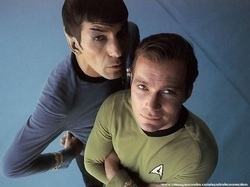A Sales Lesson from Shatner and Nimoy
 Here in Reno, we have an independent bookstore called Grassroots with new and used books, and every once in while, they have a warehouse sale... fill up a bag of books from their warehouse for $5!
Here in Reno, we have an independent bookstore called Grassroots with new and used books, and every once in while, they have a warehouse sale... fill up a bag of books from their warehouse for $5!At the most recent installment of this fun-for-the-whole-family event, I picked up a LOT of Star Trek stuff, both fiction and non-fiction. I think there are several new sales lessons to be gleaned from the material that I collected, but right now, I'm just having fun reading it all. So this week's Sales and Science Fiction lesson is going to be an already-existing lesson pulled from the Handbook.
So here goes... Sales and Sci-Fi Lesson Number 31, The careers of William Shatner and Leonard Nimoy.
The Sci-Fi: William Shatner and Leonard Nimoy. Industry anecdote.
The Sci-Fi Sitch: In 1967, the world saw a science fiction television drama hit the small screen. Star Trek lasted three seasons, and immediately spawned a Saturday morning cartoon spin-off, as well as books and comics and fan conventions. A decade later, a motion picture. Then more movies, syndicated sequel television series, and finally, well into the new millennium, a motion picture re-boot trilogy. Much of the enduring success of Star Trek has to be laid at the feet of William Shatner, who played the dashing self-confident Captain James T. Kirk, and Leonard Nimoy, who played the hyper-logical, faintly sinister and mysterious half-human, half-Vulcan science officer Mr. Spock.
But on the other side of the coin, perhaps much of the subsequent success of the long and profitable careers of both Shatner and Nimoy has to be laid at the feet of Star Trek. The franchise gave them characters that really captured peoples’ imaginations, and through the following years and decades, gave them opportunities to act, write, direct and appear at conventions. Both men have done other things with their lives, big and significant projects, but the world will always know them first and foremost as Kirk and Spock.
And while the upside is obvious (more fame and fortune than you can shake a stick at), it can’t have always been easy to be the focus of what many feel to be a Sci-Fi cult. You probably personally know some Trek fans who memorize the language of the Klingons or who have studied the blueprints of the USS Enterprise until they can watch an episode and point out a door on the set and tell you where it is supposed to lead. (Or you might even be one of these kind of fans yourself.) The fans who dress up as characters from the show, who obsess over not only the characters, but over the private lives of the people who portray those characters. The money and the acclaim that Star Trek brought to William Shatner and Leonard Nimoy was not without some stress and sacrifice, not without some aspects that would, understandably, bring along a small twinge of resentment.
These actors’ ambivalence about their Trek roles has peeked through in the past. Take situations such as Shatner’s skit on Saturday Night Live in which he portrays himself at a Trek convention, becoming exasperated with the fans and telling them to go out and get a real life. Or such as Nimoy’s book, I Am Not Spock, his 1975 autobiography in which he sought to establish a distance between himself and his role. Yet, to invoke a phrase from another SNL skit (unrelated but very appropriate), Star Trek “been berry, berry good” to Shatner and Nimoy. Above and beyond the series and the conventions and the what-not, Shatner has written a number of science fiction novels, some set in the Trek universe. Nimoy’s Spock, despite having been killed off in one of the early TOS Trek films, returned to the franchise’s storyline, and even had a part in the J.J. Abrams Star Trek re-boot movie.
To be fair, I’m not saying that these two actors go around bad-mouthing Trek, or complaining about their lives. Nimoy did pen a subsequent book called I am Spock. And in the dedication of his novel, Star Trek Spectre, Shatner wrote, “Star Trek has been good to me: Fame, Fortune, Fantasy. But most of all, Friendship.”
The Sales Sitch: What both Shatner and Nimoy have done is played to their strengths. William Shatner was a classically-trained Shakespearean stage actor. Leonard Nimoy is a gifted actor and photographer who made no secret of the fact that Spock gave him a bit of an identity crisis. But the Kirk and Spock characters are what they do so well, and they are what the audiences respond to. In Shatner’s case, he’s also taken the larger-than-life charisma of Kirk and translated it to other roles and personas, such as T.J. Hooker and the Priceline Negotiator. Kirk even showed up on a broadcast of the Academy Awards, with “advice from the future.” And so, these actors keep coming back to these roles, these types of characters that have garnered them such success. If marketing is what you do so well, and it is what prospects respond to and it is what gets you sales, then keep coming back to that role. If wowing a client with the technology of your product is what your strength is, then play to it. If your strength is in providing outstanding service to your clients, then make sure your prospects know it, use testimonials from your loyal clients to make your case.
The point is, find your strength and play it to the hilt. Don’t let a sales guru, an expert, or even your manager, tell you that you have to do something different. Of course, this only applies if you are being successful; just because you like a certain mode of operation doesn’t mean it’s your strength. It’s only a strength if it is producing good results. But once you do find that strength, run with it for all it’s worth.
The Sales and Sci-Fi Lesson: Discover your strengths that lead to success, and then play to them, for all you’re worth.
The Sci-Fi Skinny: I have had the honor of hearing both William Shatner (Canadian actor, writer, director, b. 1931) and Leonard Nimoy (American actor, director, photographer, b. 1931) speak in person. I don’t pretend to know either of them, but do hold both in the highest regard. Related bonus Sales and Sci-Fi Lesson: If you’ve been in sales any amount of time at all, you’ve probably run across the advice to find photos of things relating to your goals, such as a new house, or a great new car, or something to represent your child’s college tuition, and stick them up on your bulletin board or somesuch. One of the things that I have posted on my board in my office isn’t so much one of my goals, but is a magazine clipping intended to remind me of the lesson to play to your strengths; I don’t recall what business magazine it came from, nor what year it is from, but it is a sidebar item with a photo of Shatner, noting that the Toronto Sun reported that his shares in web-based Priceline travel site were worth $582 million. That’s $582,000,000. 582. Million. Dollars. (“Wait, what?”) And that’s a great reminder of what playing to your strengths can do for you.
Published on April 28, 2014 20:37
No comments have been added yet.



